The 2025 "Digital Health" Economics Summer School, co-hosted by the Institute for Global Health and Development of Peking University and the Yale Center Beijing, was successfully held at the Peking University Science Park from June 16 to 21. Focusing on the intersection of digital technology and global health, it invited Chinese and foreign scholars to present 17 cutting-edge academic seminars, offering a series of lectures spanning a week to outstanding students from universities worldwide.
The summer school kicked off grandly on the evening of June 16. Attending the opening ceremony were Professor Gordon G. Liu, Co-Director of the summer school and Dean of the Institute for Global Health and Development at Peking University; Professor Chen Xi from the Yale School of Public Health; Professor Lei Xiaoyan, Party Secretary of the National School of Development at Peking University; Dr. Li Enyou, Director of the Yale Center Beijing; and Ms. Zhou Manli, Deputy Director of the Office of International Relations at Peking University, among other responsible teachers. Participants of the summer school also introduced themselves and shared their expectations for the program. For details, please refer to the opening ceremony report (link).The lecture content of this summer school covers multiple dimensions such as technical models, clinical applications, health economics, and global governance. The lectures started on June 17 and delivered a wonderful academic feast for five consecutive days.
On June 17, Professor Lei Xiaoyan from Peking University gave a lecture on Healthy Aging: Challenges and Countermeasures, analyzing chronic disease management and family care pressure under deep aging, and proposing a path to upgrade elderly care services driven by AI health monitoring devices. Professor Chen Xi, specializing in health policy and economics from Yale University, focused on The Application of AI Chatbots in Chronic Disease Management, revealing the dual challenges in clinical practice. Dr. Chen Ermo from Peking University elaborated on Self-Learning Systems: The Planetary Health Coordinate System as a Guide to the Safety of Human Civilization, demonstrating the innovative application of a four-dimensional dynamic model in ecological health assessment. Teacher Geng Fangli from Brown University presented The Application of Digitalization in Nursing Homes, showing practices of AI algorithms in predicting fall risks and the efficiency improvement of emergency rescue through IoT devices.
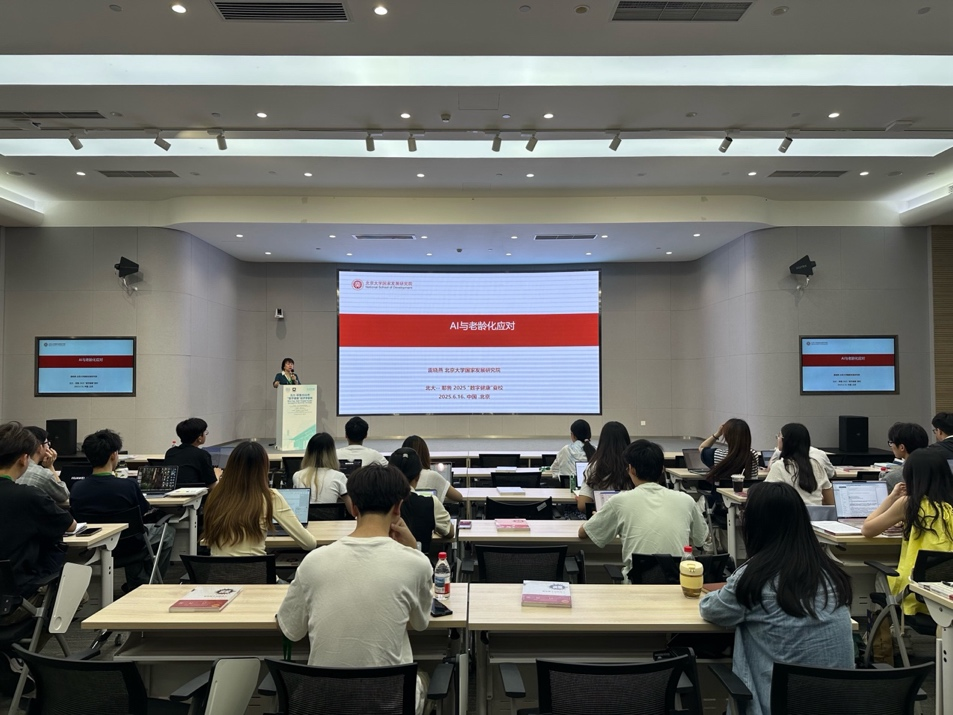
Professor Lei Xiaoyan's lecture
On June 18, Researcher Wang Lijun from the Chinese Center for Disease Control and Prevention gave a lecture entitled Research Driven by Disease Surveillance Data, explaining the big data application logic of the KERS disease surveillance system in the national public health system. Teacher Pan Yuhang from Peking University delivered a lecture on Behavioral Economics and Digital Health: From Addiction to Nudging, focusing on the digital behavioral dilemmas of adolescents and constructing an interdisciplinary theoretical framework for cognitive management.
On June 19, Teacher Huang Yuan from Yale University gave an online lecture on Change Point Analysis for Longitudinal Data Based on Censored Anchoring Events and Its Application in Huntington's Disease, demonstrating the quantitative identification technology for key nodes in disease progression. Professor Xu Ming from Peking University analyzed Innovative Financing Mechanisms in the Field of Global Health, systematically expounding the practical paths of six types of financial instruments such as debt-for-health swaps and pandemic bonds. Professor Lei Jianbo from Peking University taught How Interdisciplinary "Medical Informatics" Empowers Medical Teaching, Research and Application, showing the value of medical process optimization through machine learning cases. Teacher Yang Jianan from Peking University, with the theme From Health Cognition to Digital Health: New Possibilities for Health Behavior Intervention, explored the integration and innovation of IoT technology and behavior intervention.
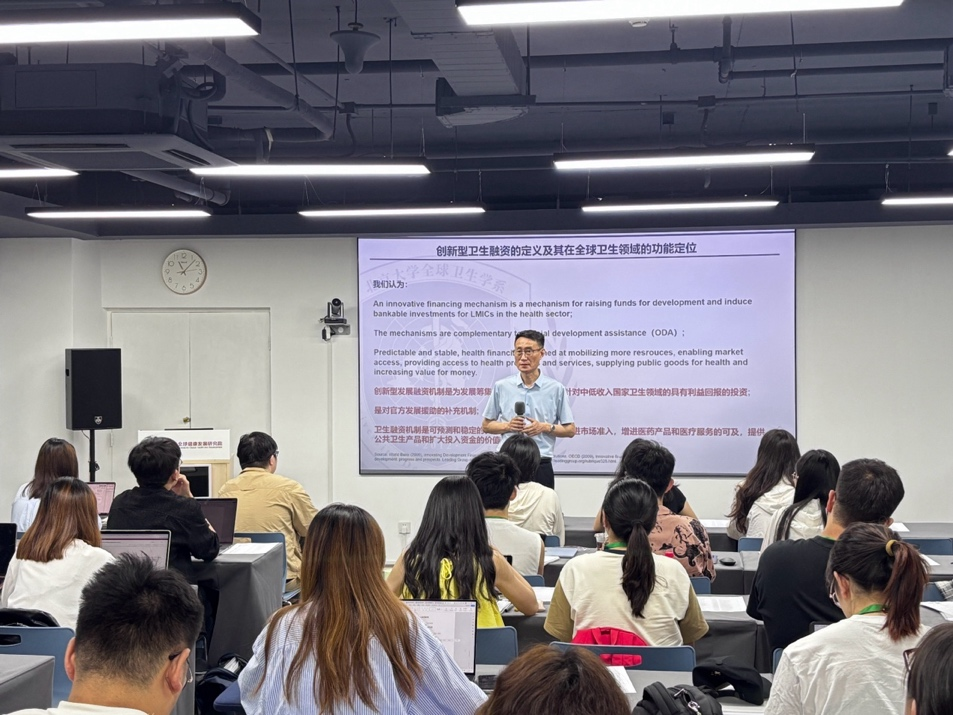
Professor Xu Ming's lecture
On June 20, Professor Huang Cheng from Peking University gave a lecture on The Economics of Vaccines, exploring the logic of public health resource allocation from the perspectives of R&D costs and vaccination benefits. Teacher Chen Shanquan from the London School of Hygiene & Tropical Medicine analyzed The Application of Artificial Intelligence in the Field of Mental Health. Mr. Lü Chenchong, Chairman of Yinzhun Intelligence, delivered a lecture entitled Artificial Intelligence Technology in Medical Imaging: Let AI Reshape the Ecosystem of Primary Healthcare in China, demonstrating practices of AI in promoting the sinking of high-quality imaging resources. Teacher Cui Zhihan from Peking University offered a course on The Application of AI-Assisted Diagnosis and Treatment—A Behavioral Science Perspective, explaining the risk prediction system for disease recurrence. Professor Jin Huajie from King's College London gave an online lecture on Health Economic Evaluation of Digital Health Interventions: Methods and Practices, analyzing the quantitative methods of cost-benefit models.
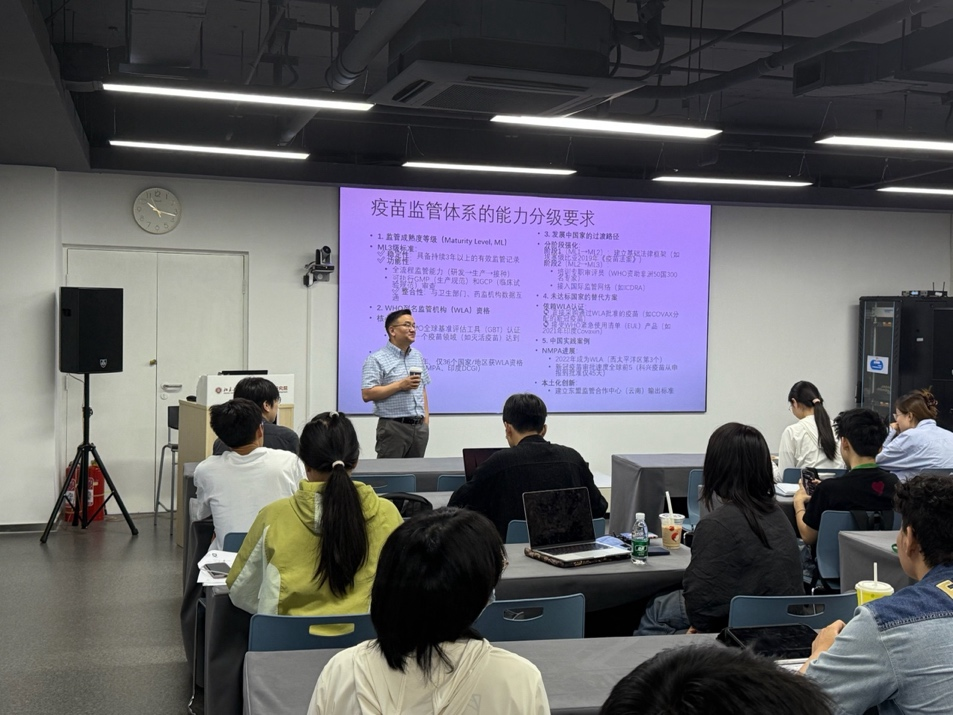
Professor Huang Cheng's lecture
On June 21, Professor Karen Eggleston from Stanford University delivered a lecture on Evaluating the Value-added Effects of New Technologies in Non-communicable Disease Management, focusing on the value verification of wearable devices in chronic disease management. Professor Sean Sylvia from the University of North Carolina, with the topic Digital Health and Beyond Illusions: Making Socio-technical Systems a Core of Global Health, explored the collaborative path between technological innovation and institutional design.
In addition to the lectures, the summer school also specially arranged a visit and exchange for teachers and students to the Yale Center Beijing. Wang Lijuan, Deputy Director of the Yale Center Beijing, warmly received the group and led the participants to visit the center's exhibition, reviewing the long-standing cooperative history between Yale University and China. From 1854, when Yung Wing, the first Chinese student, graduated from Yale and became the first Chinese to obtain a degree from an American university, to the continuous deepening of academic, cultural and talent exchanges today, the Yale Center Beijing, as a link, carries the friendship and cooperation that spans time and space.
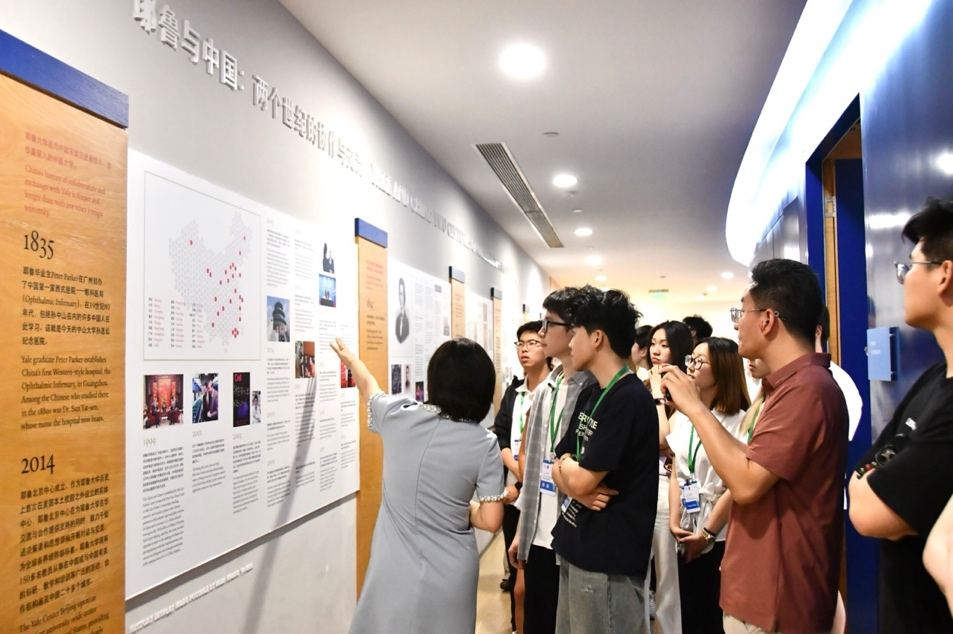
Deputy Director Wang Lijuan led the participants on a tour
The visit and sharing session was hosted by Professor Chen Xi, one of the co-directors of this summer school, who serves as an Associate Professor of Global Health Policy and Economics at Yale University and an Adjunct Associate Professor at the Institute for Global Health and Development of Peking University. Six guests delivered wonderful sharing sessions focusing on their respective academic research and career development paths. Ms. Zhang Sisi, an alumna of the Yale School of Management from the class of 2004, currently Executive Director of the Yale China Healthcare Association and Deputy General Manager of Zhongke Health (Beijing) Industry Co., Ltd., outlined the diverse opportunities and challenges in the medical industry from a global perspective for the students. Dr. Li Huan and student Pan Lining from Yale's Computational Biology and Biomedical Informatics program, Dr. Guo Pengfei from Yale's Department of Environmental Health Sciences, Dr. Guo Jianjian from Yale's Department of Cell Biology, and He Junjie, a pre-doctoral student at the Yale Tobin Center for Economic Policy, also shared their research and academic experiences respectively.
During the exchange session, students actively raised questions covering technical and practical issues such as clinical data modeling, the implementation of artificial intelligence in the health field, and the connection path between scientific research and industry. The guests responded patiently based on their academic backgrounds and experiences, creating an active and in-depth atmosphere at the scene.
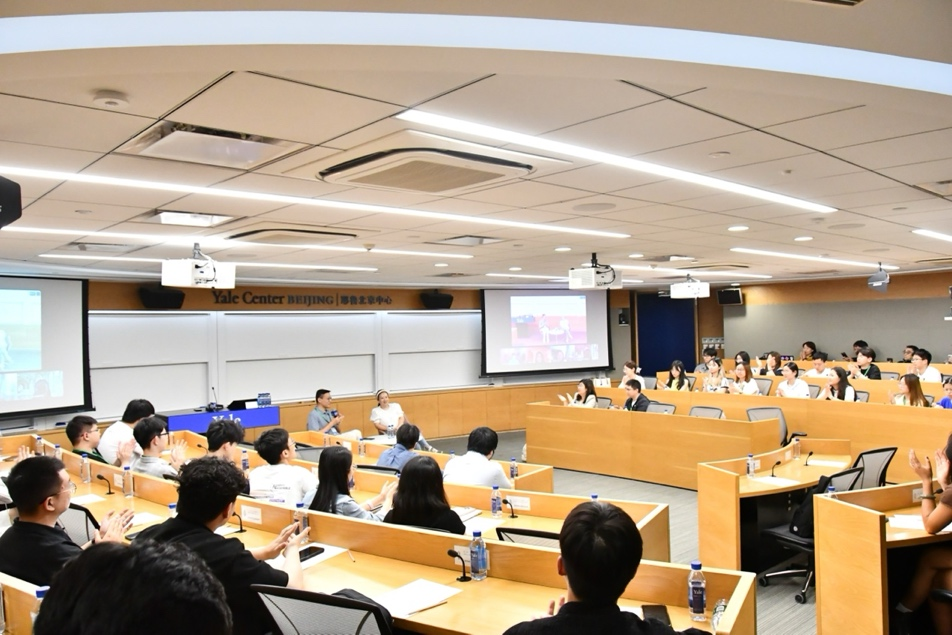
Question and Exchange Session
At the conclusion of the visit, Dr. Li Enyou, Director of the Yale Center Beijing, delivered a message to the participants. She stated that relying on the high-quality platforms of Peking University and Yale University, the summer school has successfully gathered rich academic and industrial resources, and also built a bridge for in-depth communication and learning among the students. Director Li sincerely welcomed the participants to frequently visit the Yale Center Beijing for more activities in the future, continue to expand their international horizons, and deeply explore cutting-edge issues in global health development.
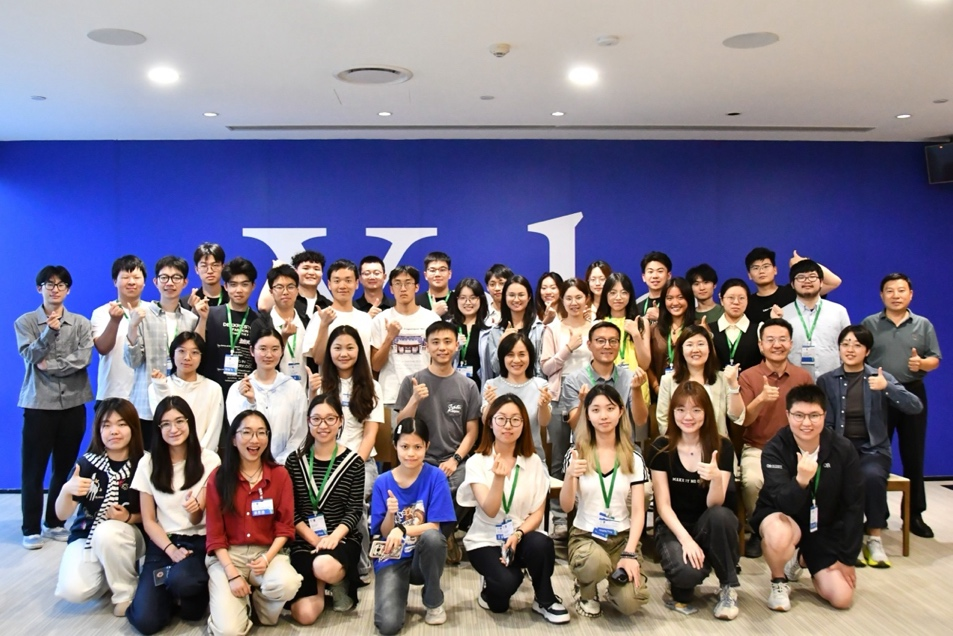
Group Photo of the Visit to Yale Center Beijing
On June 21, the summer school officially concluded at the Peking University Science Park. The closing ceremony was hosted by Pan Yuhang, Assistant Professor at the Institute for Global Health and Development of Peking University, who, on behalf of the organizers, expressed sincere gratitude to all guests, lecturing professors, and the volunteer team. He reviewed several touching moments during the summer school and stated that the interactions over the week were not only a transfer of knowledge but also a collision of ideas across disciplines and national borders. The active participation of the students, the full dedication of the professors, and the hard work and support of the staff together made this unique and precious experience possible. He also sent a message to everyone, hoping that this experience would continue to bring inspiration and strength in their future academic journeys.
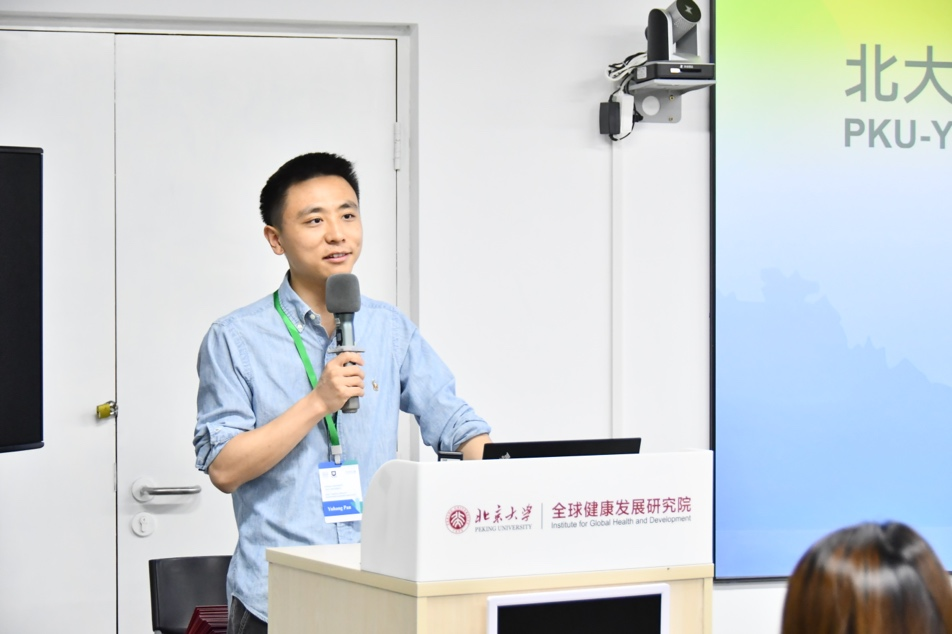
Teacher Pan Yuhang presided over the closing ceremony.
Two student representatives of the summer school also shared their experiences at the closing ceremony. Student Li Shen said that this was an extremely happy time, not only because of the rich course content and strong faculty, but more importantly, the in-depth exchanges with peers from different backgrounds made him truly feel the cohesion of the academic community and the passion for exploration. Student Saifeiya also mentioned that during this summer school, she developed a strong interest in the field of economics, and under the inspiration of interdisciplinary topics such as artificial intelligence and mental health, she expanded new research perspectives and motivation. She sincerely thanked every teacher and classmate, believing that this experience had opened up infinite possibilities for the future.

Speech by Participating Students (Left: Li Shen; Right: Saifeiya)
In his summary, Professor Gordon G. Liu, Dean of the Institute for Global Health and Development at Peking University and Co-Director of the summer school, reviewed this academic journey with three words: "fate", "beginning" and "expectation", and expressed his earnest hopes. He stated that teachers and students from all over the world gathered together because of their common concern for digital health, and this fate that transcends regions and backgrounds is extremely precious. This summer school not only delivered cutting-edge knowledge but also opened countless doors to the future for everyone. As for which door to walk through and how far one is willing to go, it is everyone's freedom and choice. He also expressed his full expectation that on the academic stage in the future, the young scholars present here will surely shine brightly and lead the way.
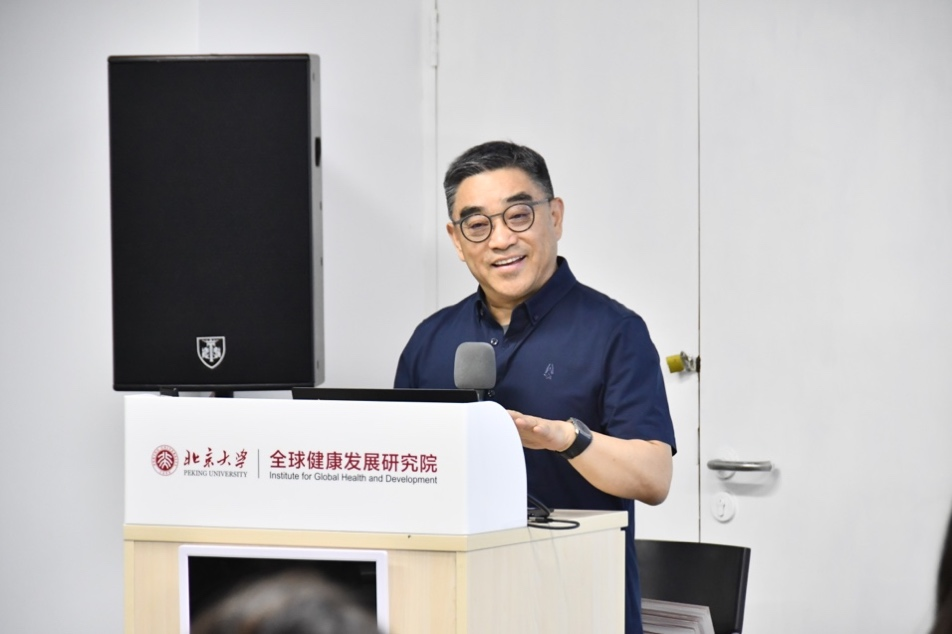
Professor Gordon G. Liu's Speech
In her speech, Wang Lijuan, Deputy Director of the Yale Center Beijing, mentioned that digital health, as a crucial issue leading the future global health progress, is profoundly reshaping the structure and operational logic of health systems. In her view, the young scholars present here are precisely the seeds and drivers of this transformation. She expressed the expectation that everyone could integrate the thoughts inspired and insights gained during the summer school into their future academic pursuits and career explorations. She also voiced her anticipation for the continued collaboration between Peking University and Yale University, hoping that the summer school could serve as a bridge to connect global young academic forces, and jointly contribute wisdom and actions to the sustainable future of human health.
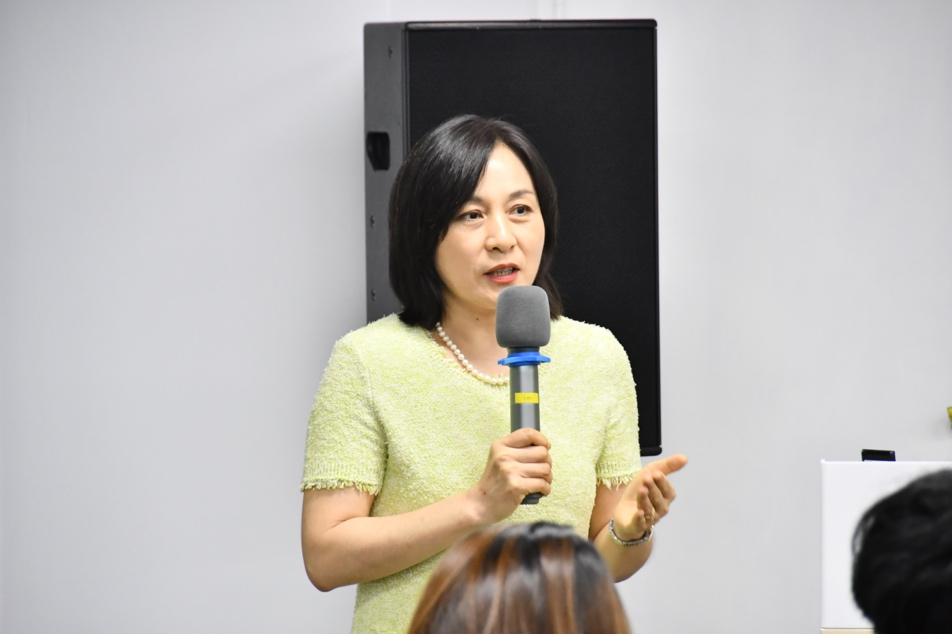
Deputy Director Wang Lijuan's Speech
At the end of the closing ceremony, the participants took turns to go on stage to receive their certificates of completion and took group photos with the teachers. Amid warm applause and reluctant sentiments, the 2025 "Digital Health" Economics Summer School jointly organized by Peking University and Yale University came to a successful conclusion. From the theoretical frontier of "digital health" to in-depth exploration of interdisciplinary practices, from knowledge impartation by top international scholars to ideological exchanges among young talents, this summer school has sown the seeds for cultivating future leaders in the field of global health with its rich content and far-reaching significance.
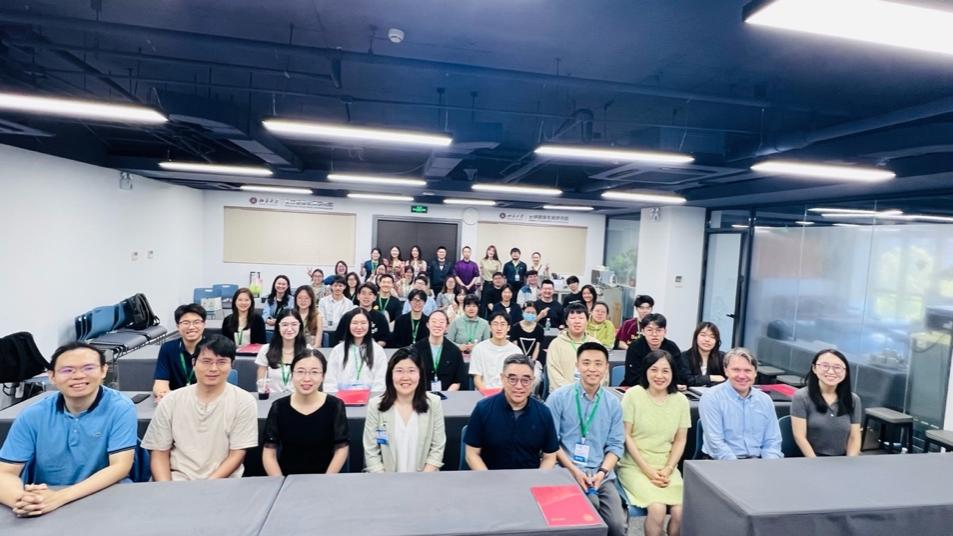
Group Photo of the Closing Ceremony